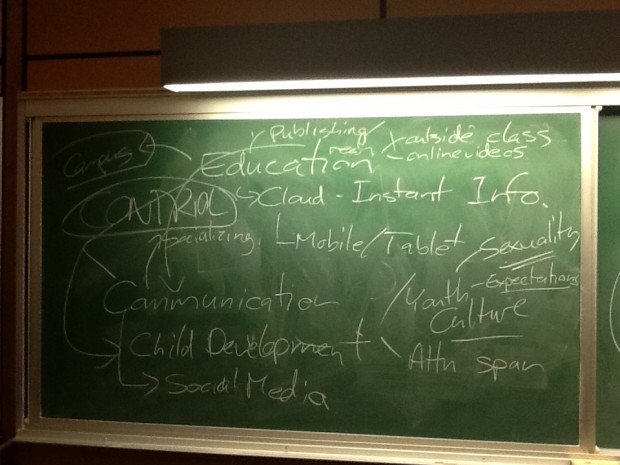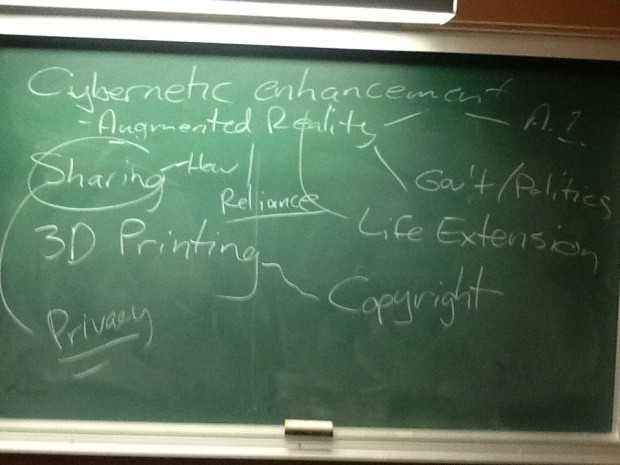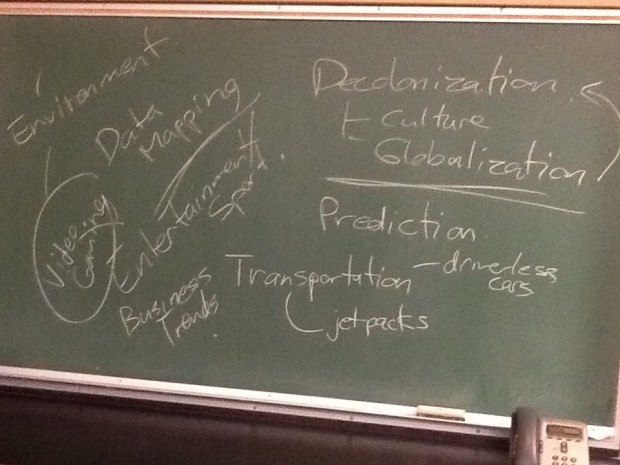Blog #3
Sonya beat me to this film, but I want to take a slightly different spin on how Minority Report works tech and society. Instead of looking at a world without crime, I want to look a world without interface.
For those of you that haven’t seen the film, Minority Report‘s most recognizable scenes involve eyes and hands: your eyes (inadvertently) control advertising billboards and can be used like a debit card and your hands can control your fancy new computer as if you’re conducting an orchestra. This is amazing technological imagination…for 2002.
There are some issues with the tech the film showcases. For one, I don’t think the world would ever like to be controlled by our eyes. We’d love something (like Google Glass) that we could control WITH our eyes, but having companies base ads on our retinas would never fly. We’re close enough with tailored Facebook ads (based, in a way, on what our eyes see) and that already causes some problems. For Tom Cruise, the problems of being tracked through his own eyes are worth replacing them. With the help of a homeless guy. With eyes he found in the rankest fridge ever…
Ok, so the eyes might be a bit far-fetched and probably (hopefully) won’t be a viable reality anytime soon, but the computer interface could happen today. People have already created wavy-handy interfaces. They guy who brought the idea to Spielberg brought an actual working model, and he later went on to design the Kinect XBox 360 platform. The idea has been used in countless movies before and since, but I think Minority Report shows the most realistic version of this impractical technology because Cruise has to wear gloves. While the Kinect uses cameras and our own class’ guest speakers have used cameras for creating interactive art installations, wired tech is still the most reliable. So Tommy puts on his gloves and starts waving, avoiding any spatial or visual issues they still seem to be having in 2054…
It’s like Star Wars Force control meets steam punk, future that has collided with a world’s imagination that still can’t imagine things without touch…even though it is an interface without touch. While the film has amazing futuristic cars, jetpacks and even mind reading thingies that can stop crimes before they happen (how cool and future is that?!) they still need gloves. Maybe 2002 was a pessimistic year, but they just couldn’t go gloveless.
Now, how this movie didn’t crack the top 20 of the Top 100 Sci-Fi movies list David posted astounds me. I definitely thought this was better than Star Wars V (everyone knows A New Hope is better than Empire!), but the awesome yet impractical technology is probably keeping it where it is because the script doesn’t help.
Apparently Tom Cruise had a lot of trouble acting with that computer. The movements made him so tired (yes, that’s real sweat) that he needed to take breaks from filming every five minutes. Reminds me of GMail Motion…
Now while someone fixes the coding issues on this site, excuse me while I go watch Serenity and weep.


 By the way, the Challenger disaster’s anniversary is today. If space actually defined the 20th Century, why have we forgotten it so soon? Perhaps that century (and likely this one) will be defined by change. Not progress or advancement, but short attention spans.
By the way, the Challenger disaster’s anniversary is today. If space actually defined the 20th Century, why have we forgotten it so soon? Perhaps that century (and likely this one) will be defined by change. Not progress or advancement, but short attention spans.

